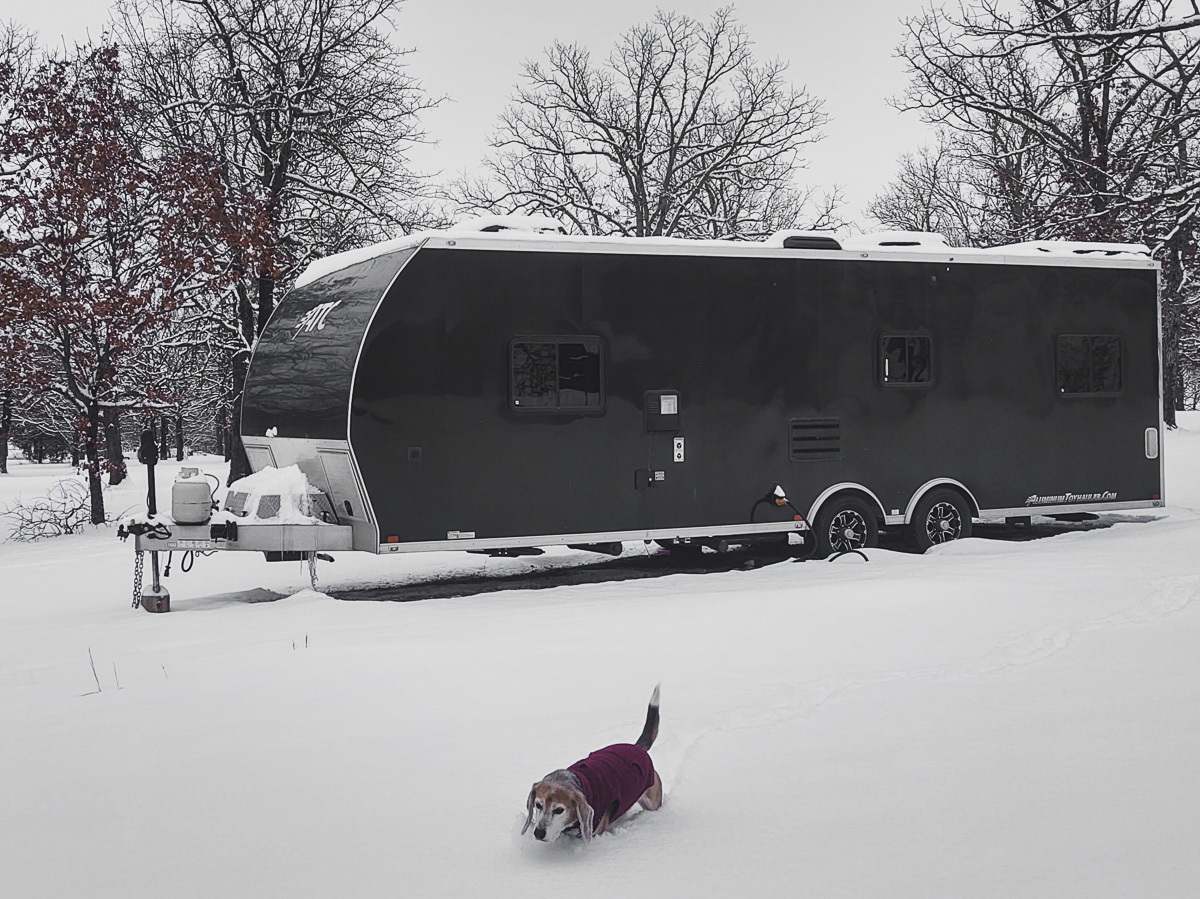You can keep your RV water pipes from freezing by using water line heaters and wrapping them with insulation. You can also add skirting to your RV to stop wind from blowing underneath. Others will go to the extreme of running a portable heater underneath their RV.

How Do I Keep My RV Water Pipes From Freezing?
The water pipe that connects your water tank to your water pump is the most vulnerable part of your RV’s water system. It’s the first to freeze up when winter weather hits. There are several strategies that boondockers use to keep their lines flowing during freezing temperatures.
Water Line Heaters
This is the most popular method. These are heating pads (see it on Amazon) that wrap around your water line. They get power from your battery bank. Most of these heating pads are designed to turn on automatically when air temperature drops below 40 degrees F. You should wrap the entire line exposed to outdoor air.
Note: Because these heating pads are connected to your battery bank, they will draw your batteries down quickly. You will need to keep power flowing into your battery bank while using these heating pads.
Wrap Your Water Pipes with Insulation
We recommend double wrapping, first with a layer of yellow fiberglass wrap (see it on Amazon), and then again with some kind of foam rubber tape (see it on Amazon).
Note: Insulation alone is only a low-level defense against freezing-temperature. We recommend first wrapping your pipes with water line heating pads (see above) and then doing the double insulation wrap.
Skirting Your RV
This is just placing barriers around your RV to prevent wind from blowing underneath. The heat from inside your RV will actually radiate through the floor to help keep your water pipes from freezing. However, wind will blow that heat away. If you can stop the wind from blowing underneath, you will greatly increase your chances of maintaining running water.
Many companies sell RV skirts. These are often made of vinyl and will attach to your RV with Velcro or rivet-snaps.
You can also make your own barrier…
- Place plastic storage bins all around your RV and filling them with something to prevent the wind from them away.
- Building a snow bank all around your RV will work too, provided you have enough snow.
- Reflectix sheeting (See it on Amazon) is very effective as a skirt. It will trap the heat underneath your RV, and prevent wind from coming in. You will have to tape it to your RV and run a skirt all around your RV. Use lightweight tent stakes (See it on Amazon) to secure the Reflectix to the ground (so that the wind doesn’t pick it up).
Place a Portable Heater Underneath Your RV
First, this only works if your RV is skirted (see above). Many boondockers have been known to place an electric space heater underneath their RV. Don’t use a propane heater because the propane exhaust will not have anywhere to go. To do this, you will have to keep your generator running to provide 120 volt power to your heater.
Turn Up the Heat Inside Your RV
The heat inside your RV will radiate through the floor to help keep your water pipes thawed. Increasing that heat will help it a little more. Do this only if you have the electricity to spare, and if you don’t expect freezing temperatures to remain for very long. It’s more important to have power available to keep your body warm.
Keep a Water Faucet Running
As a boondocker, you really don’t want to keep water running. But, if you’re water lines are unprotected using the methods listed above, then at least keep them running on a trickle. Use whatever spare containers you have to at least capture that water.
Note that you don’t have to turn on the faucet as soon as outdoor temperature reaches 32 degrees F. Your water lines may actually remain liquid down to about 28 degrees F simply because the heat inside your RV will radiate through the floor. Moreover, keep an eye on the weather and set an alarm clock on when you believe the air temperature will drop down low enough to start running your faucet. It may be you will only have to run it for a few hours.


I’m gearing up for an upcoming winter camping trip and have some notable concerns like freezing my RV hose. Thank you for sharing this useful information, will make a note of it.
I was able to enjoy winter camping with peace of mind without worrying about possible problems with the pipes, preparing them for the harsh cold of the season.